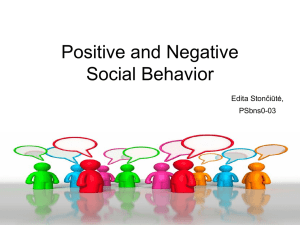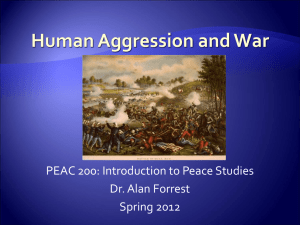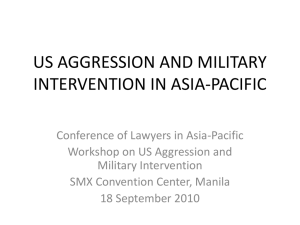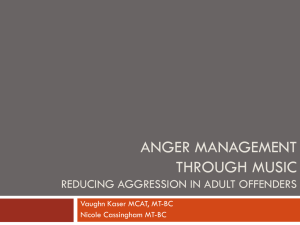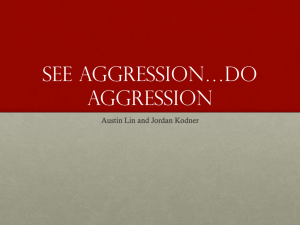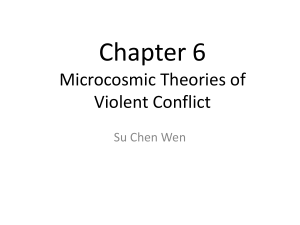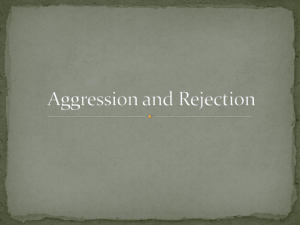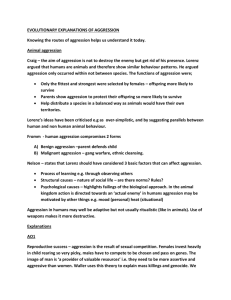Tips for answering the revision questions: Chapter 5
advertisement
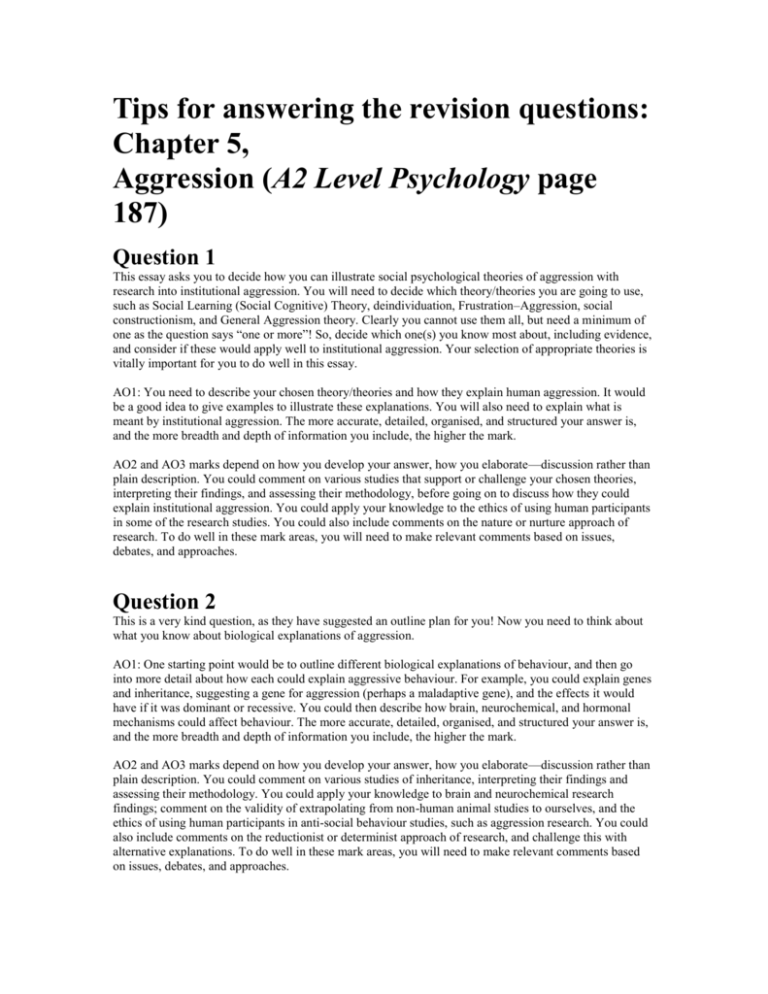
Tips for answering the revision questions: Chapter 5, Aggression (A2 Level Psychology page 187) Question 1 This essay asks you to decide how you can illustrate social psychological theories of aggression with research into institutional aggression. You will need to decide which theory/theories you are going to use, such as Social Learning (Social Cognitive) Theory, deindividuation, Frustration–Aggression, social constructionism, and General Aggression theory. Clearly you cannot use them all, but need a minimum of one as the question says “one or more”! So, decide which one(s) you know most about, including evidence, and consider if these would apply well to institutional aggression. Your selection of appropriate theories is vitally important for you to do well in this essay. AO1: You need to describe your chosen theory/theories and how they explain human aggression. It would be a good idea to give examples to illustrate these explanations. You will also need to explain what is meant by institutional aggression. The more accurate, detailed, organised, and structured your answer is, and the more breadth and depth of information you include, the higher the mark. AO2 and AO3 marks depend on how you develop your answer, how you elaborate—discussion rather than plain description. You could comment on various studies that support or challenge your chosen theories, interpreting their findings, and assessing their methodology, before going on to discuss how they could explain institutional aggression. You could apply your knowledge to the ethics of using human participants in some of the research studies. You could also include comments on the nature or nurture approach of research. To do well in these mark areas, you will need to make relevant comments based on issues, debates, and approaches. Question 2 This is a very kind question, as they have suggested an outline plan for you! Now you need to think about what you know about biological explanations of aggression. AO1: One starting point would be to outline different biological explanations of behaviour, and then go into more detail about how each could explain aggressive behaviour. For example, you could explain genes and inheritance, suggesting a gene for aggression (perhaps a maladaptive gene), and the effects it would have if it was dominant or recessive. You could then describe how brain, neurochemical, and hormonal mechanisms could affect behaviour. The more accurate, detailed, organised, and structured your answer is, and the more breadth and depth of information you include, the higher the mark. AO2 and AO3 marks depend on how you develop your answer, how you elaborate—discussion rather than plain description. You could comment on various studies of inheritance, interpreting their findings and assessing their methodology. You could apply your knowledge to brain and neurochemical research findings; comment on the validity of extrapolating from non-human animal studies to ourselves, and the ethics of using human participants in anti-social behaviour studies, such as aggression research. You could also include comments on the reductionist or determinist approach of research, and challenge this with alternative explanations. To do well in these mark areas, you will need to make relevant comments based on issues, debates, and approaches. Question 3 The focus of this essay in on how evolutionary theory can explain specific antisocial behaviours, infidelity, and jealousy. AO1: It is a good idea to start by explaining the basics of the evolutionary approach, for example, that it is based on the assumption that behaviours that were adaptive for our hunter-gatherer ancestors persist today because they have been inherited, i.e. they are nature, not nurture. Then you could go on to write about how this approach explains infidelity and jealousy—this would be mainly descriptive. The more accurate, detailed, organised, and structured your answer is, and the more breadth and depth of information you include, the higher the mark. AO2 and AO3 marks depend on how you develop your answer, how you elaborate—discussion rather than plain description. You could comment on various studies of jealousy (including how jealousy varies between the sexes); interpreting their findings, and assessing their methodology, and contrast these older studies with more recent ones, which show a focus on the importance of emotional fidelity to both sexes. You could apply your knowledge to the ethics of using human participants in this sort of sensitive research. You could also include comments on the reductionist or determinist approach of this approach, and its basis in conjecture. You could also discuss the idea that evolutionary theory would explain jealousy as the motivation for rape, and how this explanation can be supported, and also challenged. To do well in these mark areas, you will need to make relevant comments based on issues, debates, and approaches. Question 4 In this essay you can show your knowledge of how aggressive displays by groups of humans can be a demonstration of power or intimidation. You need to decide what you know enough about to illustrate your answer, using research based on sports events and lynch mobs. AO1: For sports events, there are many research studies that could be described, and you could point out that their findings and conclusions are mixed. For lynch mobs, the research is in agreement that they have intent to harm, or to murder. The more accurate, detailed, organised, and structured your answer is, and the more breadth and depth of information you include, the higher the mark. AO2 and AO3 marks depend on how you develop your answer, how you elaborate—discussion rather than plain description. You could comment on the various studies that demonstrate sports are linked to aggression, and discuss how Social Learning (Social Cognition) Theory, Social Identity Theory, and the Frustration–Aggression Hypothesis could explain this sort of group display. You could also discuss further the research studies that you have mentioned previously, interpreting their findings and assessing their methodology, and explain that not all group displays, sports-related or other, are aggressive. You could apply your knowledge to the ethics of using participant observation in some of this research, and include comments on the researcher's attitude, perhaps including a discussion of social constructionism. Lynch mobs are of course very different group displays, and the research findings are interesting and based on social factors, though this can be challenged by psychodynamic ideas, such as Freud's primal horde. To do well in these mark areas, you will need to make relevant comments based on issues, debates, and approaches.
